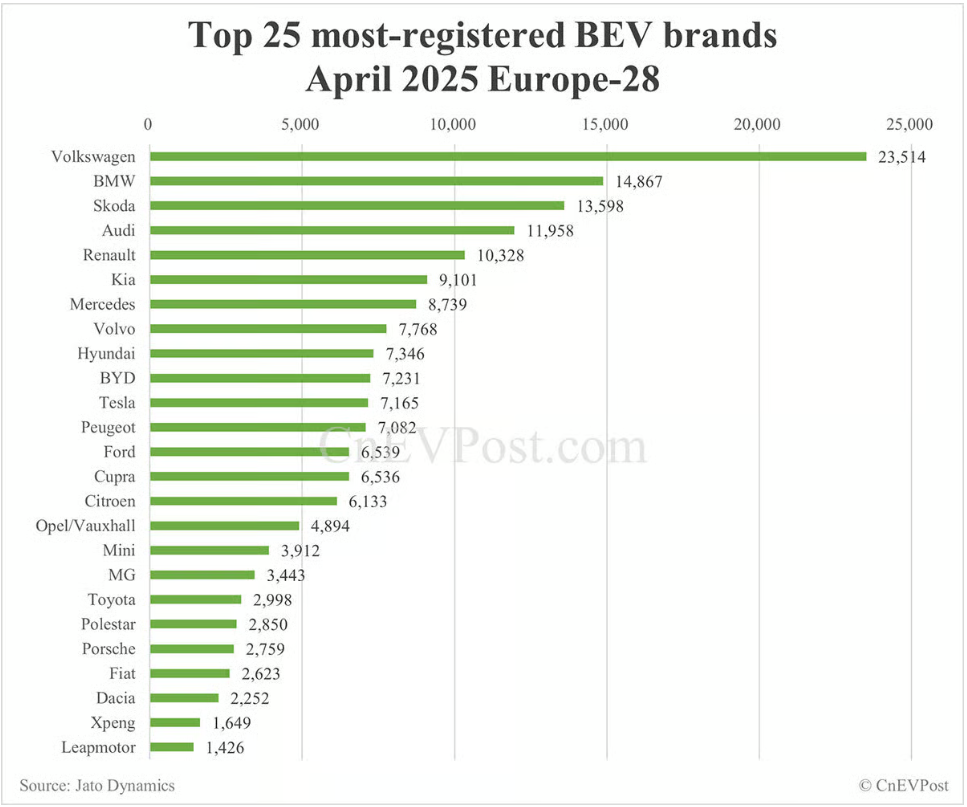China Insights Weekly highlighted China's economic and technological advances. Here are some key points from this week:
- Pfizer signs a $1.25 billion deal to license a Chinese cancer drug from 3SBio, a record biotech deal.
- China's solar installations have reached 105 GW this year, with April alone up 215 % YoY.
- Combat robot championship begins in Hangzhou, humanoid robotics heads to mass market.
- China is promoting a 3,000-kilometre railroad across the Amazon to reduce shipping time to the Pacific coast of South America.
Main News
BYD surpasses Tesla in BEV registrations in Europe for the first time, launches 7th car carrier
In April 2025, BYD registered 7,231 battery electric vehicles (BEVs) in Europe, surpassing Tesla's 7,165 units. This is the first time BYD has surpassed Tesla in the European BEV market. BYD's BEV registrations in Europe are up 169 % year-on-year, while Tesla's are down 49 %. This milestone is significant because BYD will not officially expand outside of Norway and the Netherlands until late 2022. BYD's total sales in Europe, including plug-in hybrid electric vehicles (PHEVs), increased by 359 % year-on-year. In the global market, BYD led with 15.4 % in Q1 2025, ahead of Tesla with 12.6 %. BYD is expanding its presence in Europe, launching new models such as the Seagull (renamed Dolphin Surf) to strengthen its position.
BYD has launched its seventh car carrier. The dual-fuel LNG vessel, sister ship to the BYD Hefei, is 199.9 metres long, 38 metres wide and can accommodate up to 7,000 vehicles. It follows other carriers, such as BYD Changzhou and BYD Shenzhen, with capacities of 7,000 to 9,200 vehicles. The fleet expansion supports the growing global supply of new energy vehicles (NEVs).

US healthcare giant Pfizer licenses Chinese cancer drug from 3SBio for a record $1.2 billion
Pfizer has struck a $1.25 billion deal to license an experimental cancer drug from China's 3SBio, setting a new record for licensing deals in China. The deal gives Pfizer rights to develop and commercialize the drug, which is in clinical testing for multiple cancer types. 3SBio could receive up to $4.8 billion in additional royalties if the drug meets all milestones. Pfizer is also investing $100 million in 3SBio. The deal underscores the growing interest of multinational pharmaceutical companies in Chinese biotech innovations. In 2024, the number of large licensing deals from China reached a record high, with 28 % innovative drugs coming from Chinese companies. This trend continues in 2025, with Novo Nordisk and Merck also investing in drugs from China. The deal is intended to ease investor concerns about geopolitical risks of the licensing trend that has boosted Chinese biotech.
Xiaomi taps into 3nm chip technology, matches Apple and Snapdragon chip performance
Xiaomi has reached a major milestone in semiconductor technology by launching mass production of its own 3nanometer system-on-chip (SoC), the XRing O1. This breakthrough puts Xiaomi as the fourth company in the world, alongside Apple, Qualcomm and MediaTek, capable of designing a 3nm mobile chip for mass production. The XRing O1 has 19 billion transistors, equivalent to Apple's A17 Pro SoC. Performance tests rank it among the top integrated circuits, rivaling Apple's A18 series and Qualcomm's Snapdragon 8 Elite. Xiaomi's Lei Jun confirmed that the chip will be installed in the new 15S Pro smartphone and Pad 7 Ultra tablet. The development represents a $1.9 billion investment and is part of Xiaomi's 10-year, $6.9 billion semiconductor development program. The achievement underscores China's quest for technological self-sufficiency amid US export restrictions.
Tomáš Kučera & Yereth Jansen
China-insights.com/gnews.cz - GH



